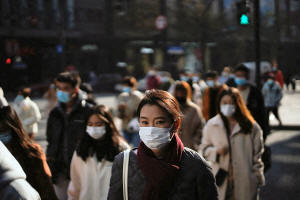South African study offers Omicron hope as countries reimpose curbs
 Send a link to a friend
Send a link to a friend
 [December 22, 2021]
By Stephen Farrell and Estelle Shirbon [December 22, 2021]
By Stephen Farrell and Estelle Shirbon
JERUSALEM (Reuters) - A South African study
offered pre-Christmas good tidings about the severity of Omicron on
Wednesday as the fast-spreading coronavirus variant forces countries
across the world to impose new curbs.
Governments urged citizens to vaccinate as Omicron becomes the dominant
strain, upending reopening plans that many had hoped would herald the
end of the pandemic, and unnerving financial markets.
Germany, Scotland, Ireland, the Netherlands and South Korea have
reimposed partial or full lockdowns or other social distancing measures
in recent days.
German health experts said on Wednesday that new curbs probably did not
go far enough as the health minister said he had not ruled out a full
lockdown.
Italy is preparing new measures and might make vaccinations obligatory
for more categories of workers, Prime Minister Mario Draghi said.
Austria, Belgium, the Czech Republic and Spain were also considering new
curbs.
Omicron was first detected last month in southern Africa and Hong Kong.
Studies indicate it is more resistant to vaccines developed before it
emerged.

However, the South African study suggested that those infected with
Omicron were less likely to end up in hospital than those with Delta.
'POSITIVE STORY'
The study by the National Institute for Communicable Diseases (NICD) and
major universities, which had not been peer-reviewed, compared South
African Omicron data from October and November with data about Delta
between April and November.
The authors found that the risk of hospital admission was roughly 80%
lower for those with Omicron, and that for those in hospital the risk of
severe disease was roughly 30% lower.
"In South Africa, this is the epidemiology: Omicron is behaving in a way
that is less severe," said Professor Cheryl Cohen of the NICD, one of
the authors.
"Compellingly, together our data really suggest a positive story of a
reduced severity of Omicron compared to other variants."
Still, the authors included caveats and cautioned against jumping to
conclusions. A study by Imperial College London released last week found
no sign that Omicron was milder.
Policymakers across the world are scrambling to address the economic
blow that might come from new outbreaks; Britain on Tuesday announced 1
billion pounds ($1.3 billion) of support for businesses hit hardest.
Some 300 South Korean business owners protested in Seoul on Wednesday
against the return of strict social distancing rules, urging the
government to scrap its "vaccine pass" policy and compensate them for
losses.
[to top of second column]
|

People wearing protective masks walk on a street, following
new cases of the coronavirus disease (COVID-19), in
Shanghai, China, December 20, 2021. REUTERS/Aly Song/File
Photo

Israeli Prime Minister Naftali Bennett welcomed a Health Ministry
panel's recommendation that the over 60s, those with compromised
immune systems and health workers should receive fourth COVID shots.
FREE TEST KITS
But Professor Lawrence Young, virologist at the University of
Warwick in England, said it was difficult to justify this "in a
situation where around 73% of people in wealthy and middle-income
countries have been (fully or partly) vaccinated ... whereas only
12% are vaccinated in Africa".
The Israeli recommendations require approval from the ministry's
director-general, and it was not clear when that might happen.
More than 275 million people have been reported to be infected with
the coronavirus around the world, and nearly 5.7 million have died,
according to a Reuters tally.
Infections have been reported in more than 210 countries and
territories since the first cases were identified in central China
in December 2019.
U.S. President Joe Biden on Tuesday promised to distribute half a
billion free rapid COVID-19 tests, and warned the quarter of
American adults who are unvaccinated that their choices could spell
the "difference between life and death".
Japan reported its first suspected case of community transmission of
Omicron on Wednesday, while India has urged its federal states to
prepare for surges and allowed them to impose restrictions on crowds
and gatherings.
Some wealthy countries want to shorten the time between second
vaccination shots and boosters, hoping this will reduce the need to
burden weary citizens with new lockdowns.
Australia on Wednesday reported more than 5,000 daily infections for
the first time. Prime Minister Scott Morrison nevertheless insisted
that strict lockdowns would not be brought back.
(Reporting by Reuters bureaux around the world; Writing by Sam
Holmes and Nick Macfie; Editing by Michael Perry and Kevin Liffey)
[© 2021 Thomson Reuters. All rights
reserved.] Copyright 2021 Reuters. All rights reserved. This material may not be published,
broadcast, rewritten or redistributed.
Thompson Reuters is solely responsible for this content.
 |